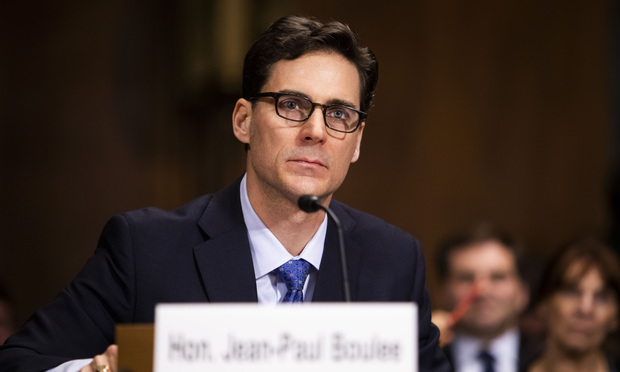Judge Won't Stop Insurer's High-Dollar Settlement Despite Policyholder's Objections
"Certainly, litigation should not ensue each time a questionable lawsuit is settled," U.S. District Judge J.P. Boulee wrote Friday.
February 28, 2020 at 03:57 PM
3 minute read
 Jean-Paul Boulee testifies before the Senate Judiciary Committee during his confirmation hearing to be U.S. District Judge for the Northern District of Georgia, on Nov. 13, 2018. (Photo: Diego M. Radzinschi/ALM)
Jean-Paul Boulee testifies before the Senate Judiciary Committee during his confirmation hearing to be U.S. District Judge for the Northern District of Georgia, on Nov. 13, 2018. (Photo: Diego M. Radzinschi/ALM)
A federal judge in Atlanta refused to stop an insurance company from consummating a high-dollar settlement opposed by the policyholder.
In a 22-page order Friday, U.S. District Judge J.P. Boulee ruled that a preliminary injunction sought by LabMD founder Michael Daugherty stopping the settlement "would not serve the public interest."
Boulee said that Sentinel Insurance Co. and other defendants "choose to settle meritless claims all the time, and they do so for myriad reasons."
"Certainly, litigation should not ensue each time a questionable lawsuit is settled," he concluded.
Boulee ruled on an emergency motion for a temporary restraining order meant to stop Sentinel and parent insurance company, The Hartford, from paying $750,000 to the owner of a defunct data security firm who tried to stop publication of Daugherty's book, "The Devil Inside the Beltway."
When Robert Boback, owner of the defunct firm, Tiversa, was unable to stop Daugherty from publishing, he sued LabMD and Daugherty for defamation over the book's contents.
The book is Daugherty's personal account of his battle with the U.S. Federal Trade Commission over a 2008 data breach at LabMD and Boback's role in the federal investigation. Tiversa gained access to LabMD's medical files, according to court documents detailing the legal fight. LabMD's data vulnerabilities prompted the FTC investigation.
Daugherty has blasted Boback's suit as "a sham," and his TRO request contended that it was not in the public interest to handsomely reward groundless litigation.
But Boulee said he was unaware of any case in Georgia or before the U.S. Court of Appeals for the Eleventh Circuit, where a judge has been asked to enjoin a settlement made within policy limits.
The judge held that that, even if the defamation claims are frivolous, LabMD and its lawyers have not clearly shown that Sentinel acted in bad faith in pursuing a settlement. "There are many reasons to settle a case," he said.
Boulee also rejected arguments that Sentinel acted in bad faith, finding the insurer didn't settle behind the plaintiffs' backs. The judge also said that Sentinel has already spent $2.9 million over six years to defend LabMD, and Daugherty has insisted on a jury trial.
"If [Sentinel] had settled on the first day of litigation, the Court's analysis might be different," Boulee added.
Boulee also rejected arguments that settling Boback's suit will chill Daugherty's free speech rights.
"Plaintiffs make no argument that the settlement would somehow prevent them from speaking out about the corruption," Boulee said. "Plaintiffs will still be able to give interviews or speak about the issues giving rise to writing the book. If [the] plaintiffs' speech was chilled by the filing of the lawsuit, neither the settlement nor a successful jury trial will negate the chill created by the initial filing."
This content has been archived. It is available through our partners, LexisNexis® and Bloomberg Law.
To view this content, please continue to their sites.
Not a Lexis Subscriber?
Subscribe Now
Not a Bloomberg Law Subscriber?
Subscribe Now
NOT FOR REPRINT
© 2025 ALM Global, LLC, All Rights Reserved. Request academic re-use from www.copyright.com. All other uses, submit a request to [email protected]. For more information visit Asset & Logo Licensing.
You Might Like
View All
Insurer Not Required to Cover $29M Wrongful Death Judgment, Appeals Court Rules

Trying to Reason With Hurricane Season: Mediating First Party Property Insurance Claims


'I Thank You': Attorney Leverages Daily Report Article to Turn $42K Offer Into $600K Settlement
7 minute readTrending Stories
Who Got The Work
J. Brugh Lower of Gibbons has entered an appearance for industrial equipment supplier Devco Corporation in a pending trademark infringement lawsuit. The suit, accusing the defendant of selling knock-off Graco products, was filed Dec. 18 in New Jersey District Court by Rivkin Radler on behalf of Graco Inc. and Graco Minnesota. The case, assigned to U.S. District Judge Zahid N. Quraishi, is 3:24-cv-11294, Graco Inc. et al v. Devco Corporation.
Who Got The Work
Rebecca Maller-Stein and Kent A. Yalowitz of Arnold & Porter Kaye Scholer have entered their appearances for Hanaco Venture Capital and its executives, Lior Prosor and David Frankel, in a pending securities lawsuit. The action, filed on Dec. 24 in New York Southern District Court by Zell, Aron & Co. on behalf of Goldeneye Advisors, accuses the defendants of negligently and fraudulently managing the plaintiff's $1 million investment. The case, assigned to U.S. District Judge Vernon S. Broderick, is 1:24-cv-09918, Goldeneye Advisors, LLC v. Hanaco Venture Capital, Ltd. et al.
Who Got The Work
Attorneys from A&O Shearman has stepped in as defense counsel for Toronto-Dominion Bank and other defendants in a pending securities class action. The suit, filed Dec. 11 in New York Southern District Court by Bleichmar Fonti & Auld, accuses the defendants of concealing the bank's 'pervasive' deficiencies in regards to its compliance with the Bank Secrecy Act and the quality of its anti-money laundering controls. The case, assigned to U.S. District Judge Arun Subramanian, is 1:24-cv-09445, Gonzalez v. The Toronto-Dominion Bank et al.
Who Got The Work
Crown Castle International, a Pennsylvania company providing shared communications infrastructure, has turned to Luke D. Wolf of Gordon Rees Scully Mansukhani to fend off a pending breach-of-contract lawsuit. The court action, filed Nov. 25 in Michigan Eastern District Court by Hooper Hathaway PC on behalf of The Town Residences LLC, accuses Crown Castle of failing to transfer approximately $30,000 in utility payments from T-Mobile in breach of a roof-top lease and assignment agreement. The case, assigned to U.S. District Judge Susan K. Declercq, is 2:24-cv-13131, The Town Residences LLC v. T-Mobile US, Inc. et al.
Who Got The Work
Wilfred P. Coronato and Daniel M. Schwartz of McCarter & English have stepped in as defense counsel to Electrolux Home Products Inc. in a pending product liability lawsuit. The court action, filed Nov. 26 in New York Eastern District Court by Poulos Lopiccolo PC and Nagel Rice LLP on behalf of David Stern, alleges that the defendant's refrigerators’ drawers and shelving repeatedly break and fall apart within months after purchase. The case, assigned to U.S. District Judge Joan M. Azrack, is 2:24-cv-08204, Stern v. Electrolux Home Products, Inc.
Featured Firms
Law Offices of Gary Martin Hays & Associates, P.C.
(470) 294-1674
Law Offices of Mark E. Salomone
(857) 444-6468
Smith & Hassler
(713) 739-1250






